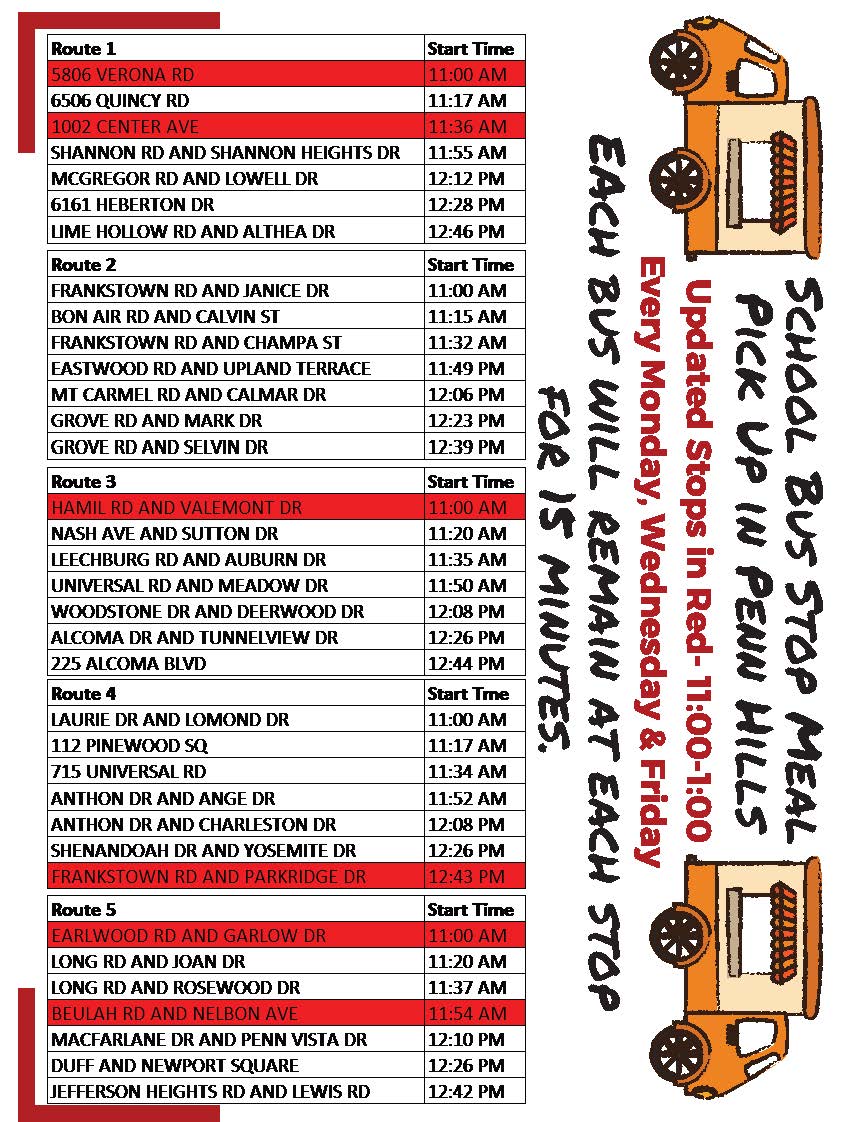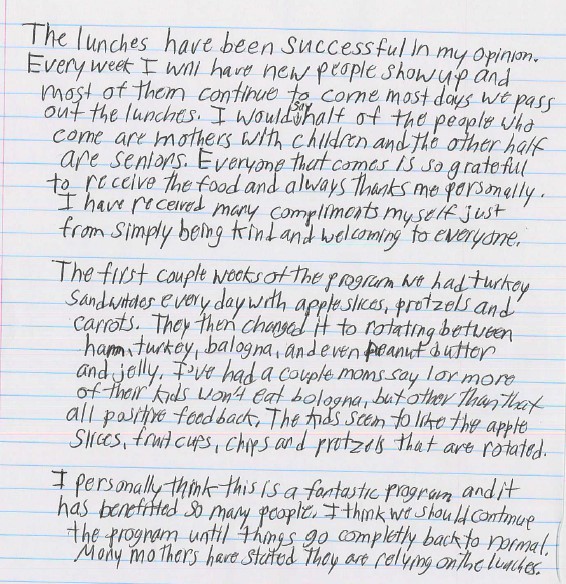
AWARD WINNING PROJECT - Utilizing School Bus Routes to Deliver Meals to Families in Need
Through a collaborative partnership spanning government, nonprofit, and local business, Prof. Stephen Smith created an artificial intelligence algorithm that optimizes bus stops and food delivery routes to ensure children, families, and seniors throughout the Penn Hills area can receive meals at convenient locations during this difficult and uncertain time. With startup funding from Metro21's sister organization, Traffic21 Institute, Metro21 acted as the liaison with partners that include the United Way of Southwestern PA, Eat’n Park, A Second Chance Inc, Carnegie Mellon University, Allegheny County Department of Human Services, Penn Hills School District, Greater Pittsburgh Community Food Bank, the Municipality of Penn Hills, Allies for Children, Penn Hills Clergy Association and other community organizations. Generously funded through the United Way’s Students and Families Food Relief Fund, this model has the capacity to serve an additional 1,000 meals per day.
In collaboration with Metro21: Smart Cities Institute, researchers in Carnegie Mellon’s Robotics Institute used artificial intelligence to create optimal, efficient bus routes that allow community non-profit organizations to deliver meals to senior citizens, as well as K-12 students and families who would otherwise rely on schools for free meals. The CMU tools identified ideal distribution locations in order to reach as many people as possible, three days a week. With startup funding from Metro21's sister organization, Traffic21 Institute, Metro21 acted as the liaison with partners that include the United Way of Southwestern PA, Eat’n Park, A Second Chance Inc, Carnegie Mellon University, Allegheny County Department of Human Services, Penn Hills School District, Greater Pittsburgh Community Food Bank, the Municipality of Penn Hills, Allies for Children, Penn Hills Clergy Association and other community organizations and generously funded through the United Way’s Students and Families Food Relief Fund. Collaborating with our numerous community-based partners, nearly 6,000 meals are delivered each month. The program started in July, 2020, is expanding from one municipality to several more (we launched McKeesport School District in October and will expand to McKees Rocks School District in November and is expected to continue through the end of the year (and likely longer as the pandemic continues into 2021).
In Penn Hills, PA (an exurb outside of Pittsburgh) many of the 4,000 students rely on free breakfast and lunch at school. Utilizing a data sharing partnership between the Penn Hills School District and the Allegheny County Department of Human Services, CMU researchers gathered anonymized address information and loaded it into a computer to identify locations and routes.
The funds to cover the cost of meals come from the Student and Families Food Relief Fund at the United Way of Southwestern Pennsylvania. That fund has been supported by the United Way, PNC Foundation and the Allegheny County Executive who has allocated CARES Act funding to this work. Funding for ACCESS Transportation is also covered by the generosity of the United Way of Southwestern Pennsylvania.
Data are collected and reported each day about how many meals are passed out at each location. This allows the organizers to readjust the plans as needed, while giving Smith a chance to tweak the algorithms to improve the process. Already, organizers are trying to learn how to adapt the program now that students aren’t back at school five days a week, if at all.
The program recently expanded to the McKeesport Area School District in October and expanded to McKees Rocks School District in November. Carnegie Mellon recently received funding from the National Science Foundation to investigate other areas where meal delivery programs could take place in the future.
This project was an adaptation of a previous project, in which local stakeholders tried to create a more efficient route for local schoolbuses to transport children. To learn more about this project, click here.
On February 12, 2021, Metro21 Executive Director Karen Lightman and Professor Steve Smith presented this project to HER NOPREN, a working group exploring ways to inform policy and practice in real-time, as well as examine the impacts of federal, tribal, state, and local COVID-19 relevant decisions on food security and dietary intake. View the presentation here.
Read the report for this project here.
Partners:
412 Food RescueUnited Way of Southwestern Pennsylvania
Allegheny County Department of Human Services
Allies for Children
ACCESS
Eat N' Park
Greater Pittsburgh Food Bank
McKeesport Area School District
Penn Hills School District
Sto-Rox School District
Project Team:
Stephen SmithRobotics Institute

